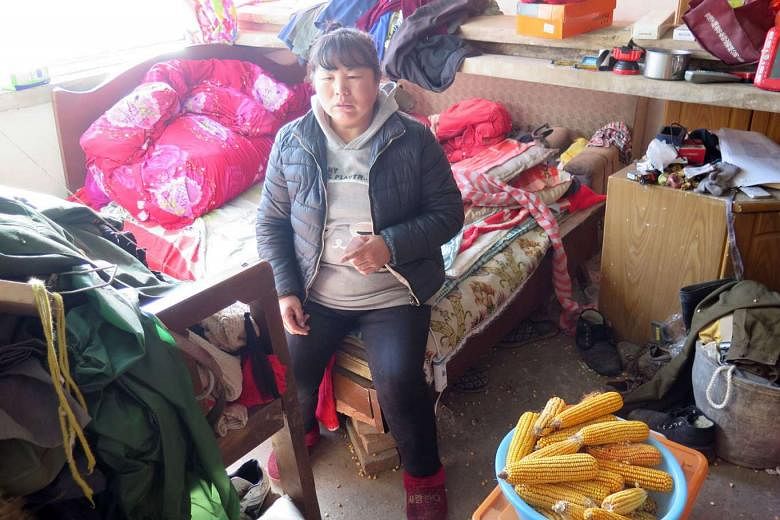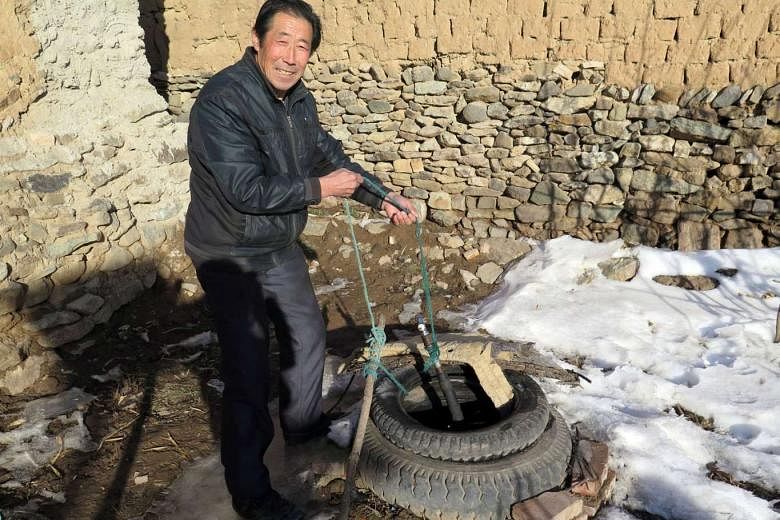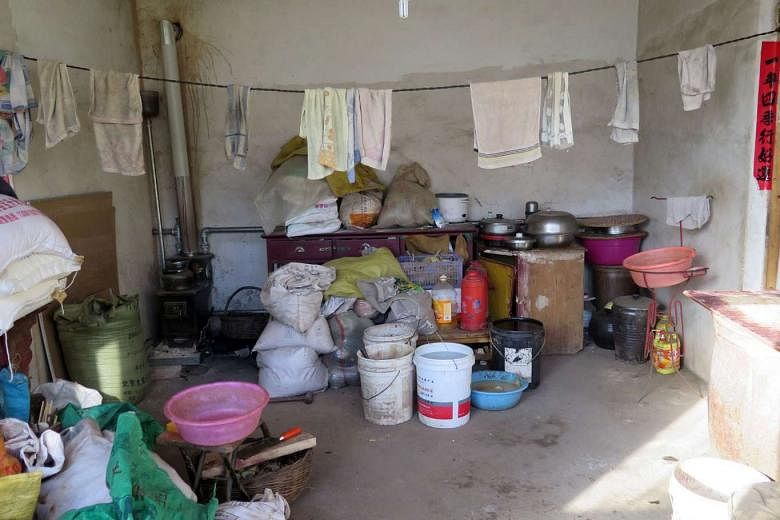ZHANGJIAKOU (Hebei) • It is not without cruel irony that the Chinese characters "xin xiang shi cheng" are written on a strip of paper pasted above the front door of Madam Zhang Xiuzhen's squalid mud-and-brick home.
The Chinese idiom means "to have whatever your heart desires", but it serves only as a painful reminder of what Madam Zhang, 39, cannot have: her sight.
With her family too poor to take her to a doctor for a cataract-removal operation, she is gradually going blind.
Together with her husband and father-in-law, she lives in the remote Aihetan village on a mountain range in northern Hebei province's poverty-stricken county of Chicheng in Zhangjiakou city. The couple have no children. Her 18-year-old stepson from her husband's previous marriage left the village a few months ago to find work in the nearby towns.
Here in Aihetan, villagers still draw water from wells and, unable to afford the more expensive coal for heating, they burn corn cobs instead to keep warm during northern China's frigid winter months.

The rugged and sloping landscape is dotted with snow-covered roofs of rammed earth buildings, many of which are the villagers' sparsely furnished homes.
Having meat for meals is a rarity, with the villagers subsisting mostly on the corn and potatoes that they grow.
Each villager has an average of about 1.7 mu of land, equivalent to about a tenth of a hectare. But with no irrigation system, they are completely at the mercy of the weather for their crop harvests.
Chicheng is one of the 592 rural counties nationwide that are officially designated as poor, but its poverty is particularly stark as it stands at odds with the wealth enjoyed by its neighbour, Beijing, China's capital and one of the country's richest cities.
The county shares a border with Beijing's Yanqing county but, while Aihetan is just 1km away from that boundary, its villagers live in a vastly different world from that of the capital.
Change might be coming, however. In November, President Xi Jinping pledged at a conference renewed efforts to lift China's remaining 70 million rural poor - individuals with a yearly income of less than 2,300 yuan (S$500) by 2010 price standards - out of poverty by 2020.
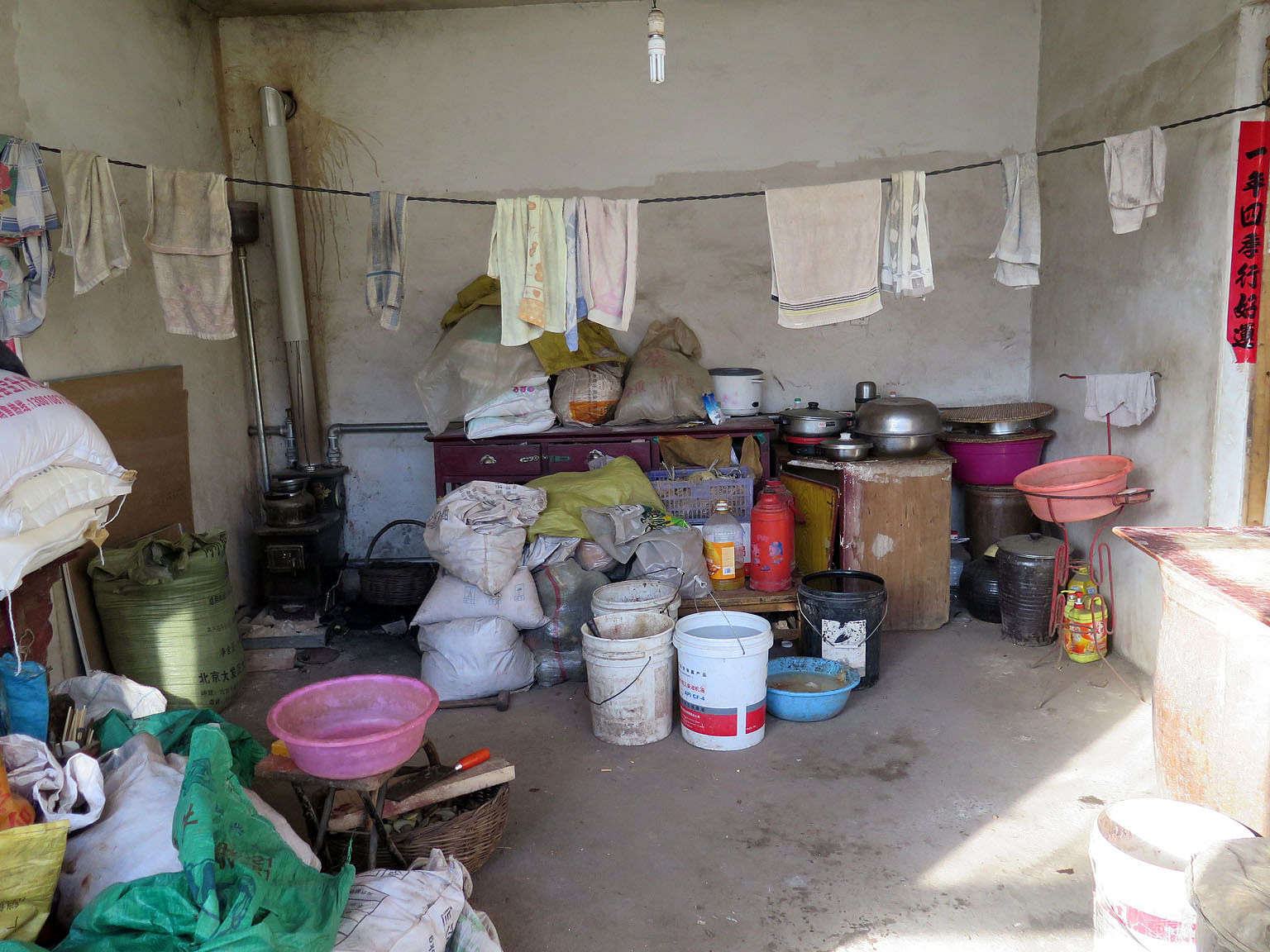
Strategies such as relocation and industrial development were highlighted and, in a sign of Beijing's determination, local officials also signed responsibility statements pledging to meet poverty-alleviation targets or face punishment.
This latest development can only be good news for Aihetan's 35 households, although the eight villagers The Straits Times spoke to were mostly sceptical about whether the plan would succeed. Many of them are in their 50s and older as younger villagers typically leave the village in search of better prospects.
"We're very poor here. We eat only what we grow, mostly corn and potatoes, and depend on the heavens for our meals. In a drought year, there are even fewer crops to harvest," Madam Zhang said.
"No one helps us. I want desperately to cure my sight but we can't afford it. Because of my illness, I don't even leave the house any more," she said, adding that their household income averages just "a few thousand" every year.
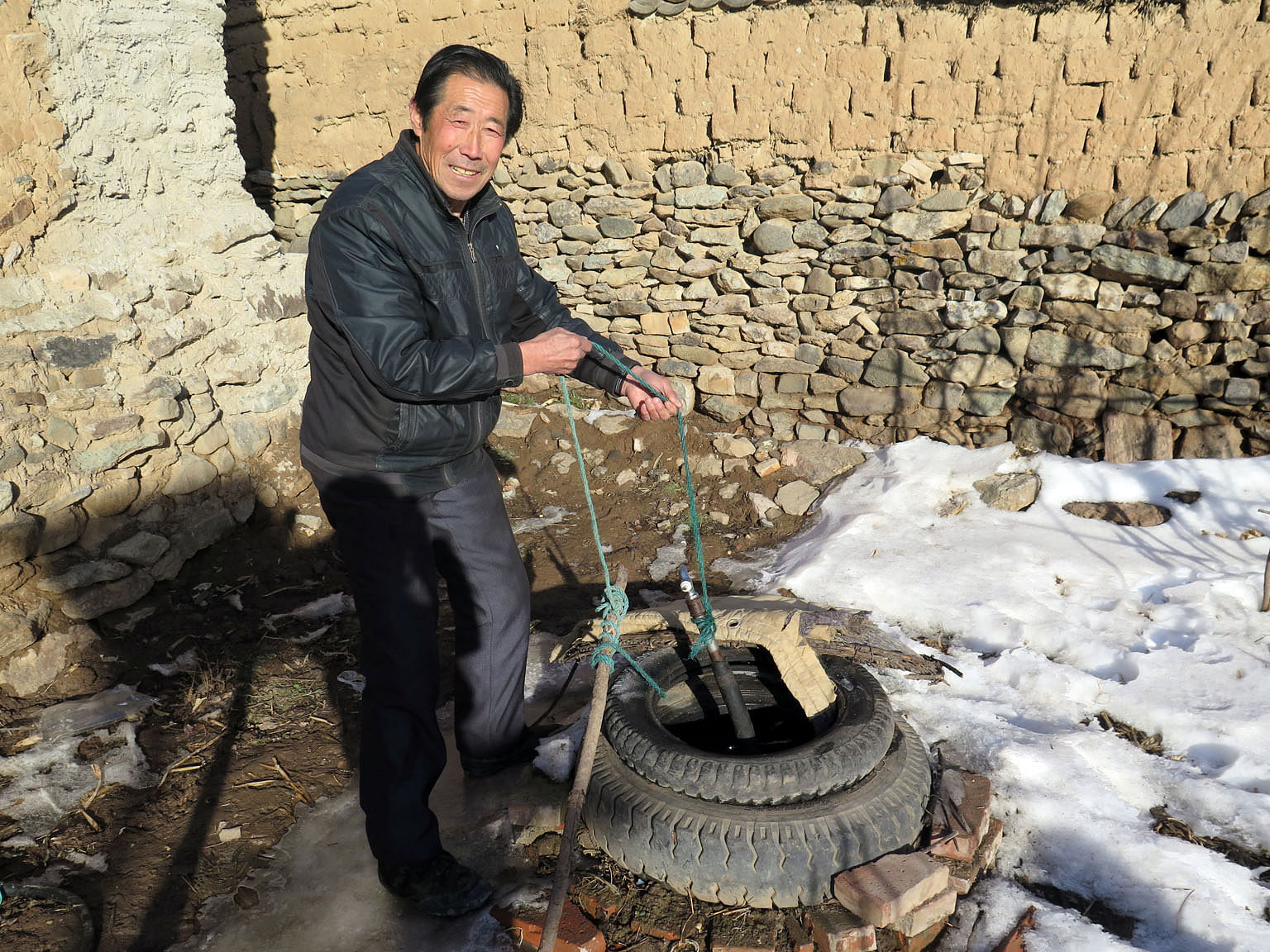
The family is also in debt of about 20,000 yuan after they borrowed money to buy three horses last year, hoping that breeding and selling them would better sustain their livelihood as Madam Zhang's ailing 60-year-old husband struggles to tend the fields due to a persistent leg injury.
Their two-bedroom home of about 50 sq m is cluttered with piles of old clothes and dust clings onto every surface.
Its walls are blackened with dirt and grime and, amid the mess, there is even a rusting kettle on Madam Zhang's bed. Without a proper sewage system, the family's toilet is just a hole dug in the ground, with a semi-circular wall of knee-high stones surrounding it, and the open sky for a ceiling.
Fellow villager Guo Zhanzhong, 67, who has lived in Aihetan his whole life, said one of the main reasons the village remains poor is its inconvenient access.
It takes up to two hours, for instance, to get to the nearest doctor at a nearby town. A winding gravel road that connects the village to Yanqing was built only two years ago. Before that, villagers had to trek through a mountain path to get there. Aihetan is just 25km from Yanqing county's main centre but 60km away from Chicheng's.
With no piped water in the village, Mr Guo makes six to seven trips each day to fetch water from a nearby well.
"We were told it was too expensive to build water pipes as it meant drilling through rock," he said. "I haven't thought about the day I lack the strength to collect water. Life here hasn't changed much, so we don't have many expectations with these new policies."
Mr Guo, who lives with his wife, Madam Wang Fenge, 64, said the couple survive on an annual income of about 2,000 yuan from selling their crops, and the occasional allowance that their five children give them. Only two are still living in the village.
But while Aihetan village paints a miserable picture of China's poor, the country has, in fact, lifted more people out of poverty than anywhere else in the world.
Its per capita income has surged, from US$300 in 1990 to US$7,600 (S$11,000) last year. Some 600 million people rose above the poverty line between 1980 and 2010 as China's rapid growth meant new roads, factories and schools that boosted employment and incomes.
Still, experts say the work ahead is the toughest as China's remaining poor are likely those stranded in remote rural areas or who cannot work due to disabilities and situations that are difficult to resolve through economic programmes and growth alone.
Rampant corruption and policies that inadvertently encourage counties to keep their official poor status so as to enjoy government handouts also underscore the complex challenges in China's efforts, they add.
"There are some contradictions in China's poverty-relief efforts now because it's difficult to identify the poor," said Professor Du Xiaoshan from the Chinese Academy of Social Sciences' Rural Development Institute. "But tools like the state-level poverty list are still helpful as it puts pressure on poor counties to properly implement poverty-relief efforts."
The list stirred controversy in 2012, the last time it was updated, when Xinshao county in central Hunan province was added. Local officials publicly celebrated then, calling it a piece of "marvellous news".
Criticism ensued and officials later admitted their words had been inappropriate. But their cheer was not without cause: The designation meant an extra 560 million yuan for the county from Beijing yearly, funds meant to be channelled towards help like subsidies for farmers.
The incident, however, led many to question the system's conflicting incentives and placed increased scrutiny on the effectiveness of poverty-relief efforts.
University of Western Ontario's Professor Terry Sicular, an expert on inequality in China, said existing programmes like dibao, or subsistence guarantee, have benefited many poor rural households.
Dibao involves cash transfers to those living below the poverty line. "But due to the large number of poor in absolute terms, many do not receive dibao," she said. "There is also substantial leakage to the non-poor, partly due to the difficulty of identifying the poor, but also due to problems such as misuse of the funds and administrative difficulties."
Lavish buildings, for instance, were reported to be built in poor counties in the past and funds found misused on gifts and banquets.
Prof Sicular also cautioned that while responsibility pledges will make local officials take poverty alleviation seriously, it may also create incentives to falsify information and lead them to focus on the targets rather than addressing poverty in a fuller, more fundamental way.
But with eliminating poverty now at the top of Beijing's agenda, Professor Guan Xinping, a poverty-relief expert at Nankai University, is confident that with stronger oversight, China can achieve its 2020 goal.
"The next priority should be introducing stricter supervision and raising transparency to ensure local officials take this task seriously and divert funds to where they are most needed," he said. Beijing spent US$43 billion on poverty alleviation last year - a 10 per cent rise from 2013.
Added Prof Du: "Details have not been given about how relief efforts will be monitored, but to be effective, it should include feedback from poor people themselves, the media, non-governmental organisations and foreign groups."
But while the 2020 goal might be achieved, the war against poverty is far from over, others say.
"This goal is just a phase in China's fight against poverty. While absolute poverty might be eradicated, relative poverty still exists with income inequality," Prof Guan noted.
Others say new kinds of poverty may emerge, with China's urbanisation push, for instance, potentially creating pockets of new urban poor among relocated rural farmers.
Whichever the case, Aihetan's villagers are not looking for change to happen to them. Instead, they are resigned to their lot, choosing to look at the bright side of their situation.
"No official has ever stepped foot in our village, so things might not change much, but at least we can say we have fresh air in the mountains," villager Wang Quangui, 65, said.

